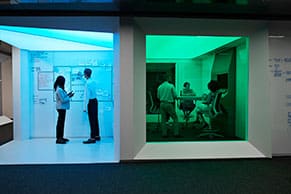Whether large or small, hospitality companies face liabilities when using outdated technology. High consumer expectations for efficient and personalized guest experiences demand stellar tech interactions at every step of the customer journey. At the same time, hospitality businesses can’t maintain profitability if they sidestep the principles of cost management in the pursuit of customer satisfaction. They need every automated advantage they can get to eliminate waste and manual effort and maximize their valuable resources. Rapidly advancing technologies are helping these companies balance both sides of this equation. Read on to learn what kinds of emerging technologies the hospitality industry is targeting for future investment and the possibilities opened up by these deployments.
What Are Emerging Technologies in the Hospitality Industry?
Emerging technologies in the hospitality industry are new offerings used by hotels, resorts, casinos, restaurants, and other establishments to transform their operations and serve customers. These technologies often feature capabilities enhanced by AI, analytics, and natural language processing and also include advancements in augmented reality (AR), Internet of Things (IoT) monitoring, and robot-assisted service.
Hospitality firms often use emerging technologies to reshape their operational workflows, such as rethinking how they schedule room cleanings or automating check-ins. The idea is to improve efficiency while raising the bar on guest experiences.
Key Takeaways
- Emerging technologies, including AI, virtual reality, sustainable materials, and robotics, are revolutionizing the way hotels and other hospitality businesses serve their guests.
- These technologies are opening up new revenue opportunities through hyper-personalization, interactive tours, and dynamic pricing.
- Advancements in smart building technology and sustainable material sourcing are helping reduce environmental footprints.
- AI and automation are poised to boost hospitality operational efficiency by eliminating repetitive manual work at resort properties and in administrative offices.
The Top Nine Emerging Technologies in the Hospitality Industry
Emergent technologies are redefining the hospitality industry, turning hotels and event venues into centers of efficient, personalized service. By using technologies like the following nine outlined below, hospitality businesses seek to boost revenue, cut costs, and deliver the level of service guests demand.
-
Artificial Intelligence
The hospitality industry is undergoing a renaissance of innovation, thanks to a range of AI-powered technologies. According to market research, 78% of hotel chains are already using AI to some degree, and 89% will expand AI use cases in the next two to three years. That growth will continue at a sustained and rapid clip, as analysts expect the hospitality industry to increase AI adoption and investment by 60% year over year through 2033.
When it comes to customer service, conversational AI in hospitality has already helped many hospitality companies improve guest services through always-available chatbots and virtual assistants. In back-of-house settings, meanwhile, hotels and restaurants lean on AI algorithms to improve operations and make better decisions about everything from staff scheduling to inventory management. Furthermore, financial planners and hospitality executives increasingly rely on AI analysis of business intelligence to optimize cost management and pricing strategies, even in the face of seasonal fluctuations. AI has also started to play a huge role in hotel and resort sustainability initiatives. For instance, when combined with IoT sensors and building management telemetry, AI allows businesses to more efficiently manage power and water consumption.
-
Hyper-Personalization
As predictive analytics in hospitality matures, it’s proving to be a growth engine for hyper-personalization initiatives that elevate both guest satisfaction and company profits. For instance, hyper-personalization makes it possible to roll out next-generation loyalty programs, dynamic pricing, and targeted promotions based on behavioral data at the individual guest level. Using a mix of inputs that include booking habits, social media activity, and onsite behavior, resorts can offer perks and amenities that pave the path for each guest’s perfect stay at a price point they’re willing to pay.
Personalization extends from marketing all the way through in-room settings. Hyper-personalization is a strong value proposition as travelers increasingly look for brands that offer more than the typical cookie-cutter experience. According to one recent study, some 68% of travelers say they’re more likely to stay loyal to hotels that deliver highly personalized experiences than to those offering traditional points-based rewards programs.
-
Automation
Future-forward hospitality brands understand that to remain competitive they’ll need to stop relying on staff to manually handle every task and interaction. Hotel automation for guest communications, front-desk services, housekeeping tasks, smart room controls, and revenue management can speed up repetitive administrative tasks and improve service delivery. The value of automation continues to increase as AI is incorporated. In fact, 86% of hotel workers report that AI automation has already helped them save time by offloading routine work.
Meanwhile, automation applied to expediting front-of-house service usually translates to happier guests. One study showed that 80% of travelers prefer hotels with a completely automated front desk or self-service technology offerings to help them get the answers and services they need in a timely fashion.
-
Mobile Check-in
As younger, digital-native generations begin to constitute the lion’s share of guest visits, self-service options like mobile check-in and mobile guest services are going to move from being a nice-to-have feature to an absolute requirement for hospitality competitiveness.
A recent study by Oracle and Skift found that among the top technologies and services popularized during the pandemic that travelers want to see permanently adopted, contactless check-in and checkout and mobile guest services occupied the number one and number three slots, respectively. Meanwhile, the rate at which the 18-to-40-year-old cohort is very interested in mobile guest services is more than double that of the 58+ crowd, further reinforcing the shift in traveler preferences for mobile offerings at hotels and resorts.
Beyond satisfaction, mobile check-in also contributes to increased profitability. These services can be tied to automated upsells and add-on offers presented during check-in that can demonstrably increase revenue per available room (RevPAR).
-
Sustainable Materials
Sustainable materials are quickly becoming the standard in hospitality as brands seek to meet their corporate environmental, social, and governance (ESG) goals and drive better cost management in the process. Business managers and procurement departments rely on tech platforms with a solid combination of lifecycle assessment tools, supply chain data, and AI analysis to help them identify sustainable materials and potentially even bake ESG certification criteria directly into the procurement process. This can help hospitality businesses compare the environmental impact of different products in real time, be they disposable or durable goods. In the case of the latter, maintenance data and IoT telemetry help analyze the durability and repairability of assets, as well as track the carbon footprint of such items as furnishing and structural elements.
In addition, many hotels use tech-enabled fixtures and building methods to improve the energy efficiency of their facilities. This not only diminishes their carbon footprint but also offers significant profitability gains. Sustainable and energy-efficient facilities tend to spend less on utilities and waste management. They also command higher rates, as environmentally conscious travelers are increasingly willing to pay premium rates for brands that demonstrate a commitment to eco-friendly practices.
-
Dynamic Spaces
Clever use of technology enables hospitality companies to get the most out of their real estate through dynamic spaces that adapt environments fluidly to meet a diverse range of guest needs over the course of a day, week, or season. For example, a small hotel could use a single space as a co-working lounge by day and a cocktail bar by night. Or a large resort might create spaces that can easily transition from event ballrooms to conference venues.
Technology plays a role in the planning and execution of such transitions. Tech-driven space planning and scheduling tools can help property managers and event planners predict demand for specific areas and automate configuration workflows for layouts. IoT-enabled environmental controls for HVAC, sound, and scent systems can automatically optimize ambiance for specific uses. Digital signage and integrated audiovisual platforms can help update messaging and branding, based on how spaces are reset.
-
Virtual and Augmented Reality
Hospitality firms are beginning to tap into the business possibilities of virtual and augmented reality (VR/AR) technologies for room and meal selection, as well as new onsite experiences. The first wave of technologies has focused on VR to offer virtual tours of rooms, amenities, and event spaces to help guests and event planners explore properties remotely. These early adoptions have helped bolster booking confidence and improved conversion rates, especially for global brands.
Many hotels and resorts have also started to elevate their guests’ onsite experiences through the use of AR enhancements. These technologies—often paired with digital signage or mobile apps on guests’ phones—provide engaging ways to offer interactive property maps and immersive experiences. AR-powered guided tours and gamified experiences create new avenues for ticket sales and partnerships with local businesses. In addition to guest-facing technology, AR/VR also provides opportunities for improving employee experiences related to staff training and facilities maintenance, particularly for those in far-flung locations.
-
Enhanced Cybersecurity
Hospitality executives fulfill the dual mandate of digital transformation and improved cybersecurity by implementing new tech stacks that are built with security embedded from the outset, rather than added as an afterthought. This secure-by-design ethos demands systems and platforms that are continuously monitored and securely coded. Risk-conscious hospitality brands are also building security infrastructure around these hardened systems that include modern protections, such as AI-powered threat detection, zero-trust architectures, and frictionless identity and access management that balances usability with security controls.
This proactive approach is crucial for hospitality brands to protect their vast troves of customer data and 24/7 operations from disruptive ransomware and costly breaches. The many layers that constitute an effective cybersecurity technology program can be complex, which is why many organizations turn to security frameworks, including the National Institute of Standards and Technology Cybersecurity Framework and ISO/IEC 27001, to provide guidance in developing comprehensive technical roadmaps and policies.
-
Robotics and Smart Devices
Advances in AI, IoT, and robotics technology are converging to elevate hotels’ use of robotics and smart devices from serving as an occasional novelty to being an everyday tool for improving efficiency and guest satisfaction. Recent market analysis indicates that in the next 10 years the global hospitality robot market will grow from $20.6 billion to $126.4 billion. Robots that deliver items like snacks and towels are becoming increasingly functional, thanks to improvements in autonomous navigation, as are housekeeping robots for vacuuming and washing. In restaurant operations, robotic kitchen and bartending assistants reinforce the consistency of grilling, frying, and drink-mixing.
Many hotels are adding a layer of smart devices armed with occupancy sensors, smart lighting, and cameras to adjust lighting and climate controls for ambiance and safety, help security teams monitor facilities and conduct crowd control, and allocate staff correctly for maintenance and housekeeping. In addition, smart thermostats and voice-activated controls create an in-room experience that maximizes guest comfort and personalization.
The Outlook for the Hospitality Industry
Hospitality leaders understand implicitly that the future profitability of their industry is fully wrapped up in digital transformation. They recognize that emerging and evolving technologies are central to the mission of building quality guest experiences and more efficient hotel operations, which remain the twin pillars of hotel financial performance. One recent study reveals that hotel executives believe technology and automation investments are the best drivers of ROI over the next five years, beating out other priorities, such as facility and infrastructure updates, staffing, and talent development. This focus on emerging tech holds fast across other areas of hospitality as well, spurring billion-dollar investments on global smart stadiums and high-tech cruise ships, for example.
Regardless of venue, hospitality establishments need every edge possible to remain competitive in increasingly challenging environments. Wide-scale labor shortages are putting businesses in a bind as they try to meet guest demand that’s finally returned to pre-pandemic levels. Supply chain shortages and inflationary pressure are ratcheting up operational costs. In addition, guests have higher expectations for travel and leisure processes, such as button-pressing immediacy and personalization of service from their phones. At the same time, they’re more price-sensitive than ever, which is quashing hotel RevPAR growth as a result.
The good news is that advances in predictive analytics, IoT telemetry, AI, and automation can ameliorate some of the biggest challenges. Housekeeping robots automate cleaning duties, while AI-powered scheduling and occupancy sensors help optimize staff deployment. At the same time, guest-facing technologies, such as mobile check-in, smart room controls, and personalized entertainment menus, are helping hospitality businesses cater to the comfort, control, and convenience of guests to keep them satisfied. Future-proofed hospitality firms are layering in AI-powered personalization throughout the customer journey—starting with curated booking recommendations and extending through custom-tailored loyalty rewards. These companies are also turning to advancements in predictive analytics and AI insights in the business office to help drive more profitable pricing and procurement decisions. Plus, ERP systems that track market trends, historical sales data, and real-time demand, support hospitality firms as they strive to dynamically adjust room rates and continuously improve supply chain management strategies to maximize their margin.
Deliver Exceptional, Modern Service With NetSuite ERP
NetSuite Hospitality ERP is a powerful platform that delivers its emerging technologies for business processes while arming hospitality decision-makers with the insights needed to develop investment strategies for the broader enterprise. With a combination of predictive analytics, AI, machine learning, and IoT integrations, NetSuite Hospitality ERP helps hotels and hospitality businesses optimize their resources and automate routine tasks covering everything from accounting to inventory management. By consolidating finance, procurement, inventory, and CRM, this cloud-based platform gives companies the ability to dynamically set pricing, match inventory levels to consumption trends, and predict staffing requirements, even as guest volume fluctuates.
From powerful business automation to housekeeping robots, emerging technology is helping hospitality companies address the most pressing challenges in the industry. The right technical stack makes it possible for businesses to satisfy heightened guest expectations without abandoning the fundamentals of effective cost management. In addition, dynamic spaces, AI advancements, and smart devices contribute to the safety and sustainability of hotel and hospitality operations. These advances require significant investment, but the ROI makes that spend worth it.
The Future of the Hospitality Industry FAQs
What will the hospitality technology trends be for 2026?
The biggest hospitality technology trends for 2026 will involve the use of AI and automation to deliver personalized experiences to guests in a cost-effective manner.
What is the future of AI in hospitality?
The future of AI in hospitality centers on enhancing customer satisfaction and business performance. AI insights power tailored guest recommendations and dynamic pricing. The technology also optimizes workforce and supply chain management.
What are the major challenges affecting the hospitality industry?
The hospitality industry’s major challenges include labor shortages and rising wage costs, along with persistent supply chain disruptions and growing consumer price sensitivity.








